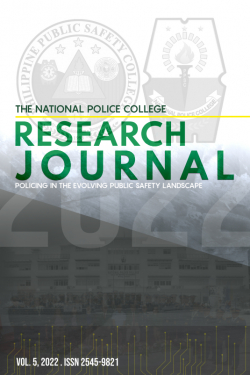ENHANCEMENT OF THE CAPABILITY OF THE PHILIPIINE NATIONAL POLICE ANTI-CYBERCRIME GROUP

Type
Thesis
Authors
Category
PSOSEC
[ Browse Items ]
Publication Year
2016
Abstract
The study aimed to assess the capability of the Philippine National Police- Anti-Cybercrime Group (PNP-ACG) in order to suggest programs and policies that will enhance its operation. It was geared toward the idea that the capability of the PNP-ACG to combat cybercrimes and promote safer cyber environment is reflected by the kind of training they had. Specifically, it was aimed to establish concrete basis on the importance of pursuing the conduct of the mandatory Cyber Cop Training Courses to enhance ACG capabilities.
The study employed both descriptive-qualitative and mixed method type of research to assess and analyze the current status and capability of the PNP-ACG. Survey questionnaires, use of checklist, Key Informant Interview (KII) and documentary analysis were used to generate the much needed data and information in this research. Likewise, enough input from its key players were used to come up with probable measures and strategies to improve the Philippine Cyber Security System.
Findings
Salient findings of this study were as follows: a) Only 50% of the PNP-ACG had at least four training attended related to cybercrime; b) Approximately 45% of PNP-ACG personnel still needs to complete the Mandatory Cyber Cop Course which is equivalent to an attendance if four obligatory training before one will earn the Cyber Cop Badge; c) Increasing trend in cybercrime cases were reported from 2013 to 2015; d) Modal responses on individual capability perceptions of PNP-ACG is not 100% capable; e) The PNP-ACG Digital Forensic Laboratory at the National Headquarters has enough resources to conduct investigations but not enough to cope with the increasing trend in cybercrime cases reported in the past three years; f)At most, only 39% of the arrested persons had cases either filed, on-going or still at the prosecutor. This shows that majority of the arrested offenders were freed either lack of action or lack of evidence which weakens the capability of the ACG to resolve cybercrimes. Hence, efforts done in the arrest of this offenders were mostly wasted.
Conclusions
Based form the findings of this study, the following conclusions were drawn: a) Most of the PNP-ACG personnel lacks the needed capability to investigate cybercrimes. Majority of the respondents were not confident in doing their job. Hence, more capacity building activities considering the required skills and competencies of an effective cyber police officer is needed. More so, upgrading of already trained personnel is also necessary. This will improve their self-esteem and the capability of the whole organization; b) software and other required equipment is already available and are being used in the national headquarters crime laboratory. But, with the fast emerging new technology, upgrading the software, tools and other equipment relative to cybercrime investigations should be done from time to time; c) The PNP-ACG were successful in arresting a greater number of cyber offenders. But, only 39% at most of these had cases either filed or on-going and majority of the arrested offenders were freed. This data showed a weakness on the part of the PNP-ACG in resolving crimes; d) the increasing statistics in the reported cyber-crime cases showed an increasing awareness on the part of the public. This data however is not enough considering the actual cyber offenses happening at this time.
Further, gaps in the capability of the PNP_ACG showed that at least half of the PNP-ACG personnel needs to be capacitated with the required competencies and skills before they can be effective cybercrime warrior. More so, more than 45% of the PNP-ACG personnel still needs to finish the mandatory Cyber Cop Training which is equal to four training courses before one will earn the Cyber Cop Training. Therefore, the PNP-ACG needs to have complete cyber resources not only in the National Headquarters but also in the Regional Offices to handle the growing number of cases emerging today and to capitalize more on their organizational capability and ensure that programs, projects and activities are aligned with the organizations’ strategic goal. Moreover, revisiting the existing laws and policies governing the PNP-ACG will help in improving the system. Public awareness and advocacy campaigns must be intensified to educate more people on issues relative to cybercrime prevention.
Recommendations
To enhance the capability of the Philippine National Police-Anti-Cybercrime Group, it is advised that the PNP-ACG should continue the mandatory Cyber Cop Training Program for the PNP-ACG personnel. Completion of all four courses offered under this program shall equip the ACG personnel with all the necessary competencies required for a Cyber Cop. Likewise, it is recommended that the PNP should capitalize on upgrading programs for already trained personnel and upgrading of software used in cybercrime investigations to cope with the fast evolving technology. Regional Anti-Cybercrime Offices and Regional Digital Forensic Laboratories must also be equipped with resources needed for cybercrime investigations and digital forensic examination. Having one Digital Forensic Laboratory at the main Headquarters of the ACG to handle the ever increasing number of cybercrime offenses is not enough.
Lastly, a revisit of all the existing laws, policies and regulations supporting cybercrime is much needed. This include refinement, improvement and injection of some of the major findings stated in this study.
The study employed both descriptive-qualitative and mixed method type of research to assess and analyze the current status and capability of the PNP-ACG. Survey questionnaires, use of checklist, Key Informant Interview (KII) and documentary analysis were used to generate the much needed data and information in this research. Likewise, enough input from its key players were used to come up with probable measures and strategies to improve the Philippine Cyber Security System.
Findings
Salient findings of this study were as follows: a) Only 50% of the PNP-ACG had at least four training attended related to cybercrime; b) Approximately 45% of PNP-ACG personnel still needs to complete the Mandatory Cyber Cop Course which is equivalent to an attendance if four obligatory training before one will earn the Cyber Cop Badge; c) Increasing trend in cybercrime cases were reported from 2013 to 2015; d) Modal responses on individual capability perceptions of PNP-ACG is not 100% capable; e) The PNP-ACG Digital Forensic Laboratory at the National Headquarters has enough resources to conduct investigations but not enough to cope with the increasing trend in cybercrime cases reported in the past three years; f)At most, only 39% of the arrested persons had cases either filed, on-going or still at the prosecutor. This shows that majority of the arrested offenders were freed either lack of action or lack of evidence which weakens the capability of the ACG to resolve cybercrimes. Hence, efforts done in the arrest of this offenders were mostly wasted.
Conclusions
Based form the findings of this study, the following conclusions were drawn: a) Most of the PNP-ACG personnel lacks the needed capability to investigate cybercrimes. Majority of the respondents were not confident in doing their job. Hence, more capacity building activities considering the required skills and competencies of an effective cyber police officer is needed. More so, upgrading of already trained personnel is also necessary. This will improve their self-esteem and the capability of the whole organization; b) software and other required equipment is already available and are being used in the national headquarters crime laboratory. But, with the fast emerging new technology, upgrading the software, tools and other equipment relative to cybercrime investigations should be done from time to time; c) The PNP-ACG were successful in arresting a greater number of cyber offenders. But, only 39% at most of these had cases either filed or on-going and majority of the arrested offenders were freed. This data showed a weakness on the part of the PNP-ACG in resolving crimes; d) the increasing statistics in the reported cyber-crime cases showed an increasing awareness on the part of the public. This data however is not enough considering the actual cyber offenses happening at this time.
Further, gaps in the capability of the PNP_ACG showed that at least half of the PNP-ACG personnel needs to be capacitated with the required competencies and skills before they can be effective cybercrime warrior. More so, more than 45% of the PNP-ACG personnel still needs to finish the mandatory Cyber Cop Training which is equal to four training courses before one will earn the Cyber Cop Training. Therefore, the PNP-ACG needs to have complete cyber resources not only in the National Headquarters but also in the Regional Offices to handle the growing number of cases emerging today and to capitalize more on their organizational capability and ensure that programs, projects and activities are aligned with the organizations’ strategic goal. Moreover, revisiting the existing laws and policies governing the PNP-ACG will help in improving the system. Public awareness and advocacy campaigns must be intensified to educate more people on issues relative to cybercrime prevention.
Recommendations
To enhance the capability of the Philippine National Police-Anti-Cybercrime Group, it is advised that the PNP-ACG should continue the mandatory Cyber Cop Training Program for the PNP-ACG personnel. Completion of all four courses offered under this program shall equip the ACG personnel with all the necessary competencies required for a Cyber Cop. Likewise, it is recommended that the PNP should capitalize on upgrading programs for already trained personnel and upgrading of software used in cybercrime investigations to cope with the fast evolving technology. Regional Anti-Cybercrime Offices and Regional Digital Forensic Laboratories must also be equipped with resources needed for cybercrime investigations and digital forensic examination. Having one Digital Forensic Laboratory at the main Headquarters of the ACG to handle the ever increasing number of cybercrime offenses is not enough.
Lastly, a revisit of all the existing laws, policies and regulations supporting cybercrime is much needed. This include refinement, improvement and injection of some of the major findings stated in this study.
Number of Copies
1
| Library | Accession No | Call No | Copy No | Edition | Location | Availability |
|---|---|---|---|---|---|---|
| NPC Library | 676148 | 1 | Yes |




